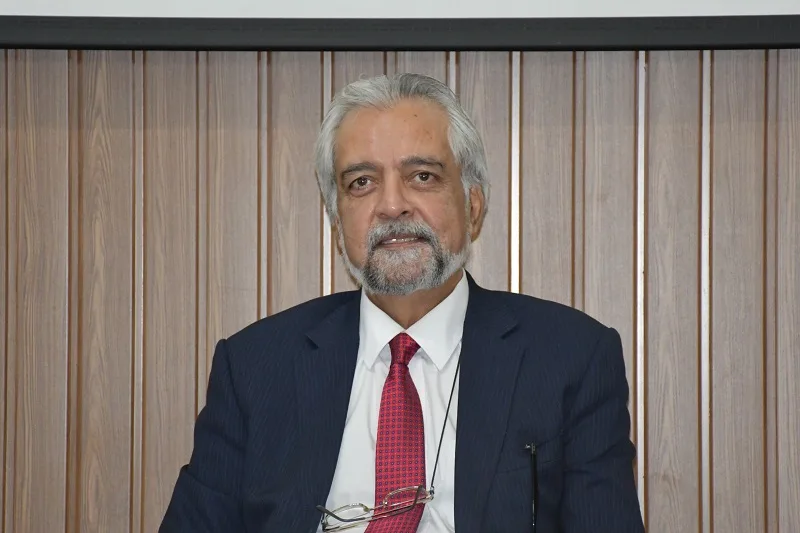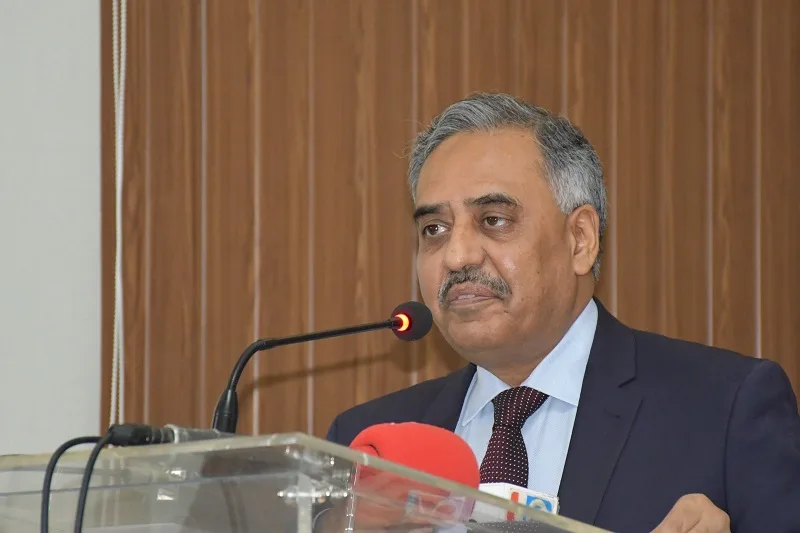ISLAMABAD, Pakistan: The Book Launch Ceremony of “Obiter Dictum” by Ambassador Najm Us Saqib was held at the Institute of Regional Studies (IRS) in Islamabad on Thursday.

Among others, the Director-General of the Institute of Strategic Studies Islamabad (ISSI) Ambassador Sohail Mahmood shed light on the professional credentials of Ambassador Najm us Saqib, eulogizing his services and contributions to the society.
Ambassador Sohail Mahmood also expressed his valuable views about the book ‘Obiter Dictum’.

The following are remarks by the DG ISSI Ambassador Sohail Mahmood at the Book Launch Ceremony of ‘Obiter Dictum’ at IRS in Islamabad on June 15, 2023;
“Ambassador Inam Ul Haque, Former Foreign Minister of Pakistan,
Ambassador Nadeem Riyaz,
President of IRS
Ambassador Najm us Saqib,
Accomplished diplomat and Author,
Excellency, High Commissioner of South Africa,
Distinguished guests,
It is a real privilege and personal pleasure for me to speak at this launch of Ambassador Najm us Saqib’s book, Obiter Dictum. I welcome other speakers and discussants who would be reviewing the book from their respective vantage points. And, most importantly, we would have the author himself to share his thoughts about his journey and to respond to the participants’ observations, comments and questions.
Let me begin, first, by telling about the person. Ambassador Najm us Saqib has been a colleague and dear friend for nearly 38 years now. In 1985, we joined the Foreign Service together, went through the rigours of training at various academies, and then pursued our respective paths in this eventful career over the next three decades. As a diplomat, he went on to represent Pakistan in Dhaka, Ottawa, Madrid, Baku and Nairobi. He also served as our Ambassador to Cuba, High Commissioner in South Africa, and then Ambassador to Brazil. He concluded his successful innings as a Special Secretary and Director General of the Foreign Service Academy.
Throughout these years, Ambassador Najm us Saqib distinguished himself as a staunch promoter of Pakistan’s interests. Some of his key accomplishments that I recall from my own vantage point include the successful implementation of the medical scholarship programme initiated by the Cuban Government for the needy students from AJK after the devastating earthquake of 2005. In South Africa, High Commissioner Najm us Saqib helped promote multi-dimensional relations as part of Pakistan’s deepening engagement with the African Continent. In Brazil, he achieved a significant breakthrough in opening a new defence dialogue platform and enhancing bilateral cooperation in this field.
A more interesting side of Ambassador Najm us Saqib is his being a man of letters. Apart from the book under review here, he has authored 7 books in poetry and prose. It is illustrative of his rich imagination and creative capacity that he easily traverses the territory from Urdu nazam to English novel. Indeed, an enviable proposition for all those who struggle with the processing of thoughts and words on a daily basis.
Thinking about this side of Ambassador Najm us Saqib, I am reminded of what celebrated poet Mustafa Zaidi, who was also a civil servant, used to say. He would say that, among the poets he gets special treatment because of being a civil servant; and, among the civil servants, he gets special treatment because of being a poet. I am sure Ambassador Najm us Saqib, likewise, has had the best of both worlds.”
Ambassador Sohail Mahmood further stated;
“Yet another dimension of Ambassador Najm us Saqib’s professional life is his stint as a broadcaster. Those of us who belong to the earlier generations know about a time when PTV was the only TV Channel, which would start somewhere in late afternoon and terminate its transmission at mid-night. In this backdrop, the start of morning transmission by PTV became quite a sensation. In the initial days, the legendary Mustansir Hussain Tarar was the main anchor. Then, one fine morning, we saw Mr. Najm us Saqib also taking that mantle and keeping a capative audience for good part of the morning through his quick wit, poetic recitals, and diplomatic anecdotes.
Still on a personal note, the memory of his organization of a mushaira with luminaries like Ahmad Nadeem Qasimi during the Academy days, our numerous chess sessions over the years, or his sudden loud recital of Anwar Maqsood Sahib’s ‘Aaj ki Pakiye’ still remain fresh in my memory. While much water has flowed down the Indus, and our hair have grayed, what has not changed is Najm’s inexhaustible energy, vivacity, and of course creativeness.
Now to this book. As those who have seen it, know that the book has received highly laudatory reviews from some very distinguished people. Former Foreign Secretary Ambassador Riaz Khokhar, who also wrote the foreword, has strongly recommended reading the book, as it contains, in his words, “a provocative and lucid overview of Pakistan’s existential internal mess, challenges and opportunities in its adjacent regions, and geopolitical hotspots that may undermine world peace.”
Noted scholar and academic, Dr. Rasul Bakhsh Rais, has characterized the book “as a work of deep reflection, profound wisdom, and a feeling for society.” Apart from the content of the book, Dr. Rais marvels at Ambassador Najm us Saqib’s “play with words and language” which he finds to be “masterly articulation of a style that is unique to men of letters.”
Several of the adjectives used by these distinguished reviewers are indeed poignant – such as provocative, lucid, reflective, playing with words. They truly capture the quintessence of Ambassador Najm us Saqib personality. Those who know him well are aware that he is anything but dull, always brimming with energy, never shorn of ideas, and mostly bold and provocative in discourse.
In his collection of op-eds and articles constituting the present book, Ambassador Najm us Saqib has been expansive — he has commented on internal developments in Pakistan as well Pakistan’s role and place in the world. From Covid to religious freedom, he has freely expressed his opinions.
On Pakistan’s foreign policy and specific issues-areas such as the global order, relations with the U.S., China, India, Afghanistan, Gulf and the Middle East, Kashmir dispute, Ukraine, FATF, SCO, BRICS — he has commented both with a heavy dose of skepticism as well as sufficient amount of hindsight wisdom (since these articles were written after he retired). Whether one agrees or not with his diagnosis or his prescriptions, it is undeniable that he writes with sincerity and a palpable feel for the country. And that passion is indeed precious.
In most cases, I was among the first recipients of his articles as soon as the link from The Nation was available. And, no matter how preoccupied I was, I never failed to open the WhatsApp message. But, I also scrupulously avoided commenting on his comments, as I was still in office and did not have the luxury of his free-lancing.
I should conclude by saying that this is a rich book — a treat for the expert and the lay reader alike, and should be read widely and carefully. Ambassador Najm us Saqib has dedicated it to the ‘soul of Pakistan’ but has modestly titled it ‘Obiter Dictum’– which is a Latin phrase that means ‘saying something in passing.’
Well, he has said deep and profound things — ‘in passing’ — that do have the potential of touching the soul of people. I wish him well and I pray that he continues to write and satiate the intellectual thirst of his large readership – in literature, in diplomacy, and in national life. More power to your pen, dear friend, Ambassador Najm us Saqib!”









